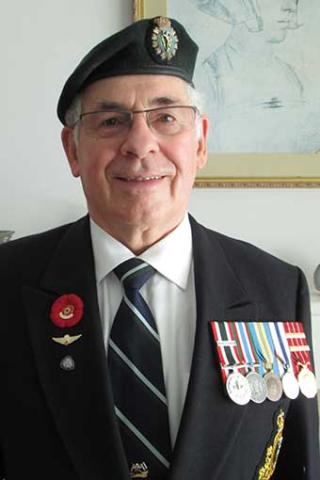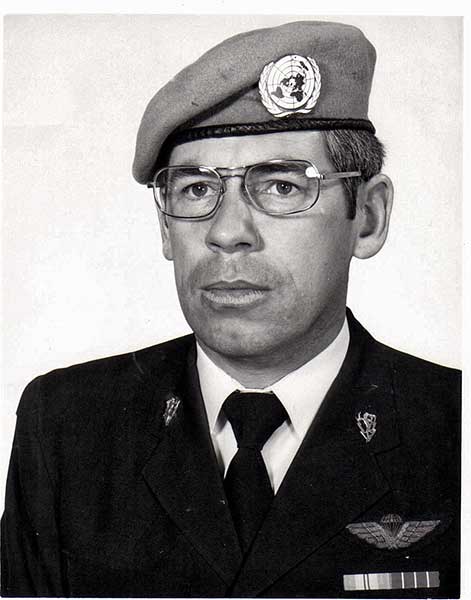
Joined
1960
Postings
- Germany
- Valcartier
- Calgary
- Chilliwack
- Petawawa
- India
- London, UK
- Brunssun, Netherlands
- Brussels, Belgium
Operational experience
- 1974 Egypt
Mac Savage can sum up his impressive career with the Canadian Armed Forces in one sentence: “I spent 36 years traveling around Canada and the world serving my country.”
He joined the Army as a reservist during his first year of engineering studies at Saint Thomas University. After graduating with a degree in history and philosophy, he joined the Regular Force with the Army’s Royal Canadian Corps of Signals, fueled by dreams of travel.
“I wanted to see the world,” he says.
It wasn’t long before he was off to the Canadian brigade in Northern Germany for six months – his first overseas posting in what would be a globe-trotting military career.
In the years that followed, he got married and had postings in Québec City, Calgary, Chilliwack and Petawawa. After completing a basic parachuting course, he was sent on his next overseas deployment – this time to the Suez Canal and Sinai Peninsula in Egypt.
Savage arrived in 1974 as part of the United Nations Emergency Force II, a peace mission made up of 11 nations, with Canada providing the largest contingent. “I was sent to the Middle East for a six-month UN tour of duty,” he says.
“We have such instant communications today – in 1974 even businesses hardly had fax machines.”
As the Commanding Officer of a communications unit, Savage led a team that established and maintained 24/7 communications to the deployed UN contingents in the Buffer Zones. Just like peacekeeping, communications were much different back then.

“We have such instant communications today – in 1974 even businesses hardly had fax machines,” he explains. “If you wanted to phone your great-grandmother in Germany from Ottawa, you probably went through about three operators…and they’d actually take a jack and plug it in somewhere to connect you.”
His unit was responsible for sending and receiving traffic over military radios and teletype, policing the telephone lines for outages, manning the switchboards and connecting field telephones. Of all the challenges they faced, one remains clearest in his mind: the unrelenting heat.
“It is so hot in the Sinai desert in the summertime, you almost have to force yourself to breathe,” he says.
“Equipment designed and built for Canadian weather does not work well in hot desert climates.”
The highest temperature recorded was 130 degrees Fahrenheit (over 50 degrees Celsius) and these temperatures would wreak havoc on their communications equipment. “The fuses on some equipment would blow at about 90 degrees Fahrenheit,” he says, adding: “Equipment designed and built for Canadian weather does not work well in hot desert climates.”
Several months into his deployment, he travelled to Cyprus for a much-deserved break. After touring the Island for a few days with his wife, their relaxing vacation took a turn when the formerly quiet streets were replaced with the blare of car horns and the sight of armed civilians. They quickly learned that a military coup d’état was responsible for the turmoil.
“Cyprus was a beautiful, quiet place, so my wife joined me for a holiday,” he says. “Fortunately, we were evacuated by the Canadian Airborne Regiment to the airport, and then by RCAF Hercules [aircraft] to Lahr, Germany before Turkey invaded.”
After his peacekeeping tour in Egypt, he headed to South India for a year-long course at the Indian staff college. This course led to the job that would inspire the proudest moments of his military career – when he and his family returned to Canada and Savage assumed command of 1 Signals Squadron in Calgary.
“That’s what I always wanted to do since I joined. I was able to do that for two years, and I think I did a pretty good job, thanks to excellent training in Signals,” he says.
Over the years, there would be many more relocations and postings in Canada and Europe. His service took him to the United Kingdom, the Netherlands, and then finally to NATO in Belgium – first as a Lieutenant-Colonel and then as a NATO civilian.
“There were frequent moves and dislocations, which made it difficult to settle down, but the variety of locations and the interesting people we met offset this,” he says. “I’ve had a thoroughly enjoyable life in the military.”
With courage, integrity and loyalty, Mac Savage has left his mark. He is one of our Canadian Veterans. Discover more stories.